What is Delegated Proof of Stake¶
Delegated Proof of Stake (DPoS) is an alternative consensus system to the typical Proof of Work or Proof of Stake consensus systems popular in cryptocurrency. The DPoS consensus system addresses the same issues with Proof of Work that traditional Proof of Stake systems address, but in a more democratic manner that gives the staking community control, rewards staking more equally from the top down and does not favor large stakeholders. It can be said that ARK is whale-proof, pun intended, and rewards “skin in the game”. To achieve this, DPoS uses a democratically elected set of Delegates who are able to forge new blocks for the chain and represent other stakers.
Staking ARK and selecting a Delegate¶
Staking your ARK and voting for a Delegate will give you the benefit of receiving more ARK from newly forged blocks. To vote for a Delegate requires a desktop wallet and more than 1 ARK in your account. To begin, from within the wallet select the account that you wish to stake with.

Once at the transaction log menu, select the “Votes” tab to begin the voting process.

Select the button, “Add Delegate” to begin searching for or entering the name of your Delegate.

When the Add Delegate modal appears, you may use the box labelled “Active Delegates (forging)” (labelled 4a in the screenshot below) to select from the active 51 forging Delegates, or you may enter the name of your Delegate in the box labelled “Delegate name” (4b in the screenshot below). Once you have selected a Delegate, move to the next step. (NOTE: I’ve selected the top Delegate for this example, but feel free to browse the available Delegates to find one that you like)
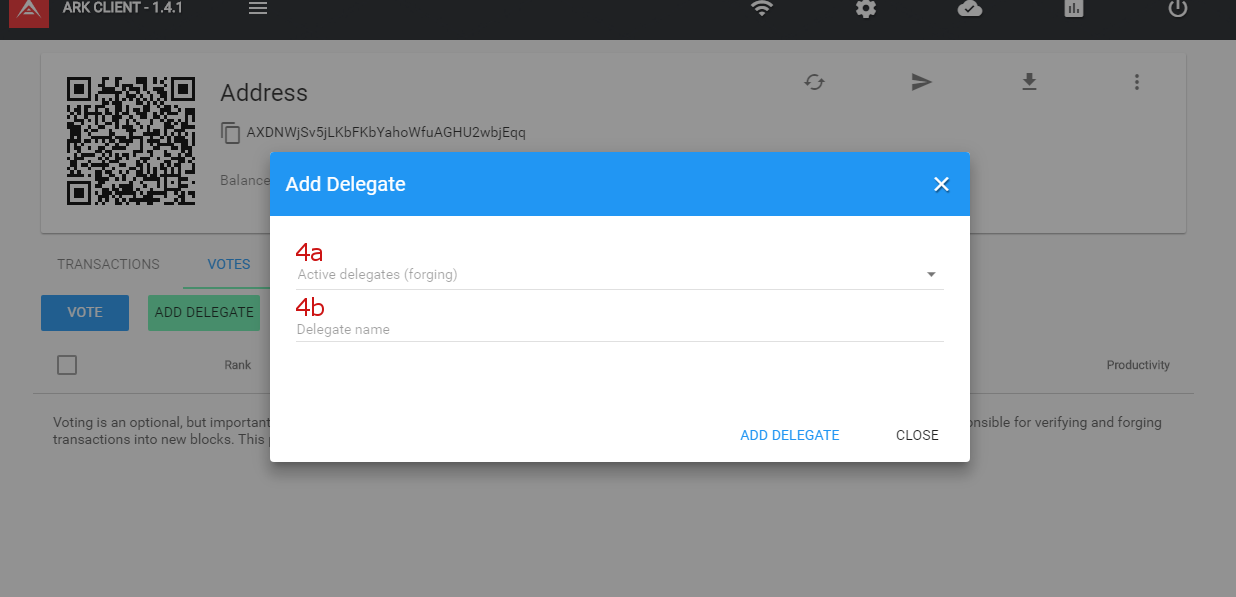
With your Delegate now selected, click “Add Delegate” to begin confirming the process.

Now that your Delegate is in your Voting tab, click the “Vote” button.
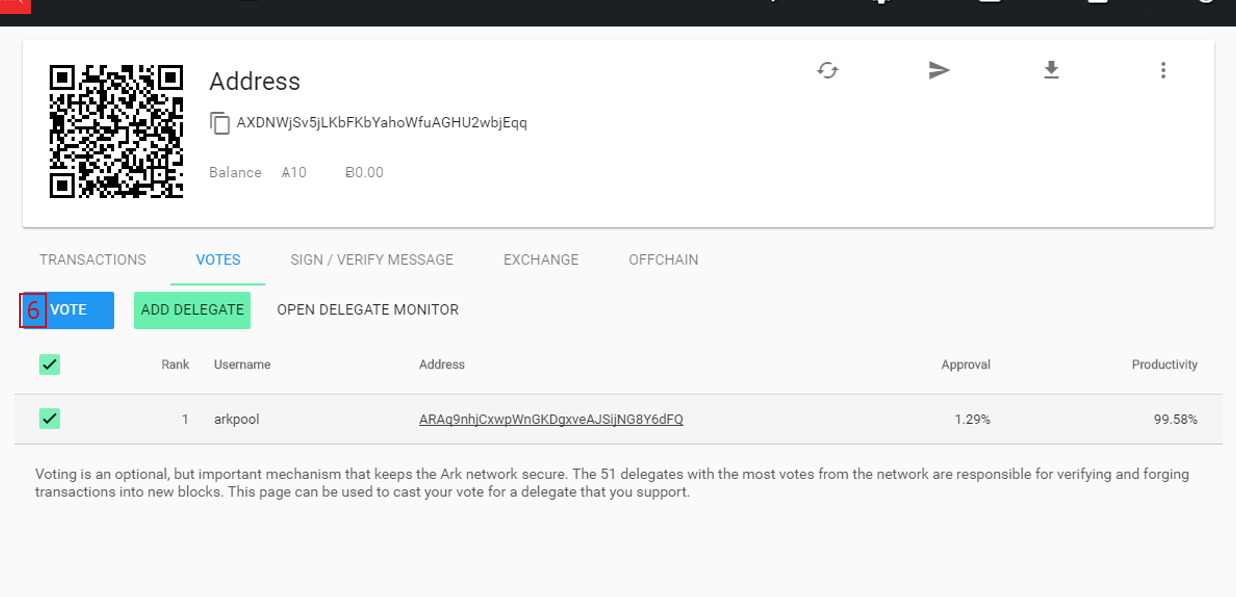
Now you will be prompted to enter your 12 word passphrase into the password field (7a in the screenshot below) and once done you may click, “Next” (7b).

A confirmation box will appear to ask you if you are sure you wish to Vote, highlighting the 1 ARK fee for the vote. Selecting “Send 1 ARK Now!” will complete your vote.

Once you’ve voted, feel free to return to your transaction page to validate your vote has been recorded.

Un-Voting¶
Selecting a new Delegate is a process called, “Un-voting”. Un-voting costs the same fee as voting does, so some users prefer to be conservative with their ARK, and instead of unvoting and re-voting (costing 2 ARK), they will move their ARK to a new wallet and vote with it (costing 1 ARK plus current transaction fee). To un-vote and keep your ARK address, please follow the instructions below.
From your ARK transaction list, select the “Votes” tab.
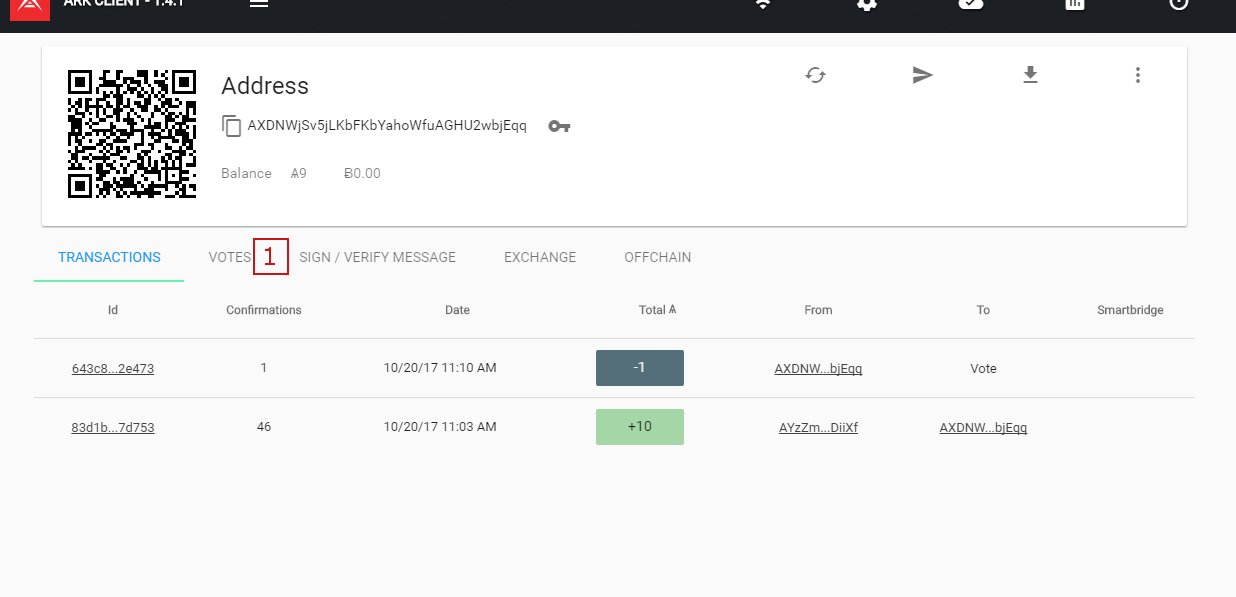
Beside your current Delegate, un-check the check box.
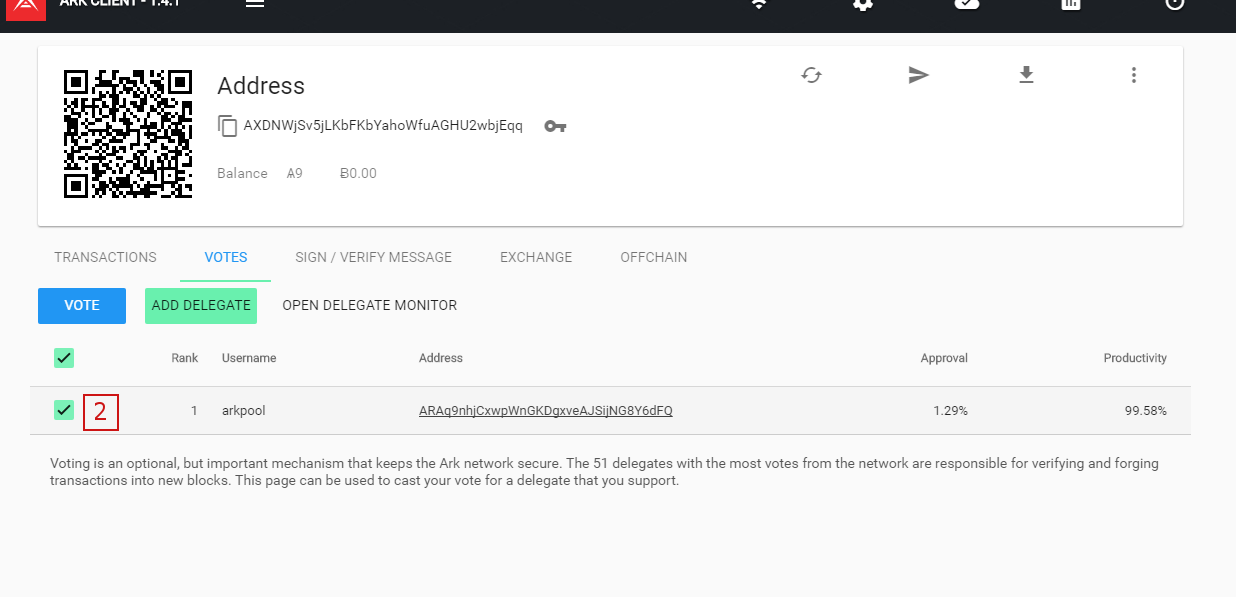
After you have un-checked the box, click “Vote”.
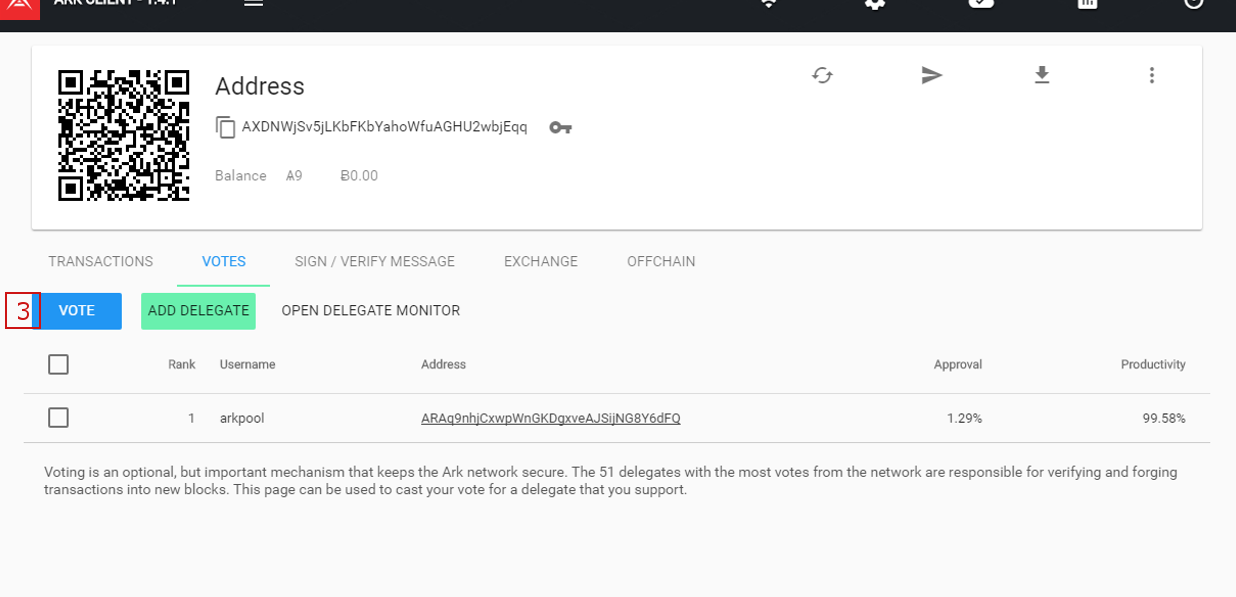
You will be prompted to enter your 12 word passphrase into the passphrase field (marked 4a in the screenshot below). After entering your passphrase select, “Next” (4b).
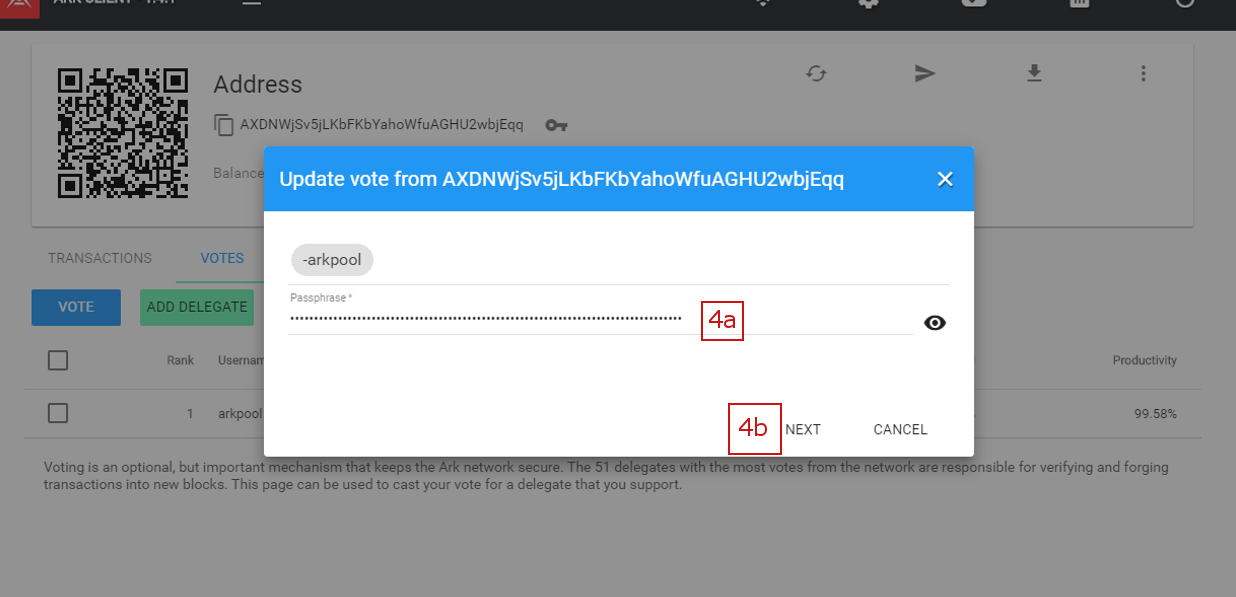
You will be asked to review the vote and the fee associated with it. Select “Send 1 ARK Now!” to complete the un-voting process.
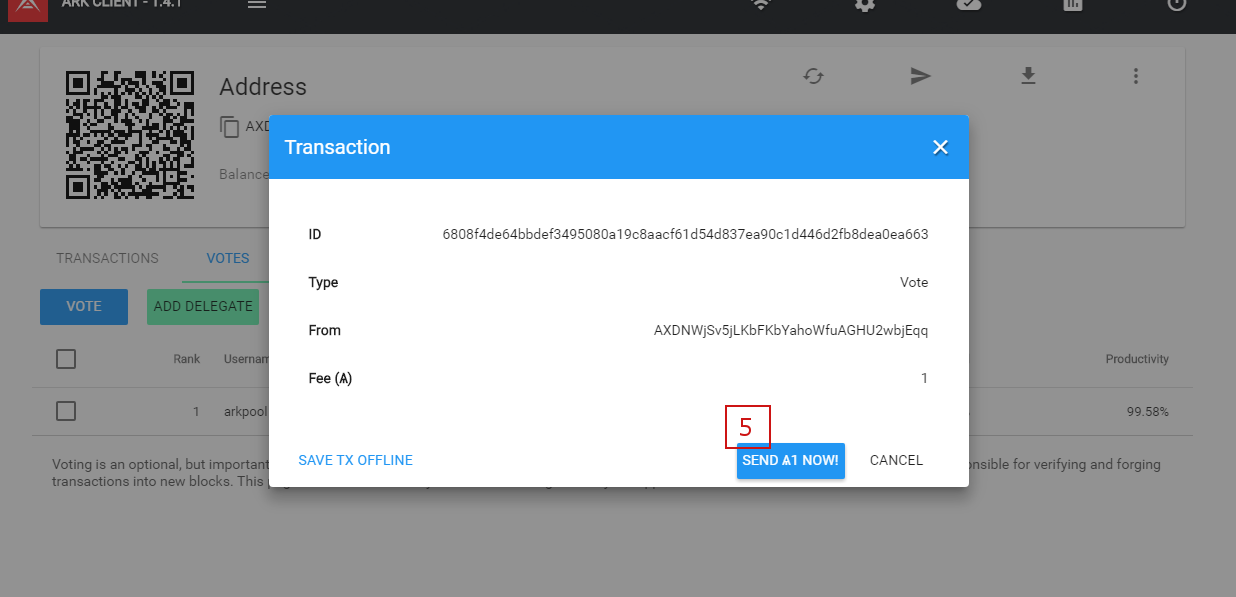
To validate, go back to your transaction list and verify that a new transaction has occurred.
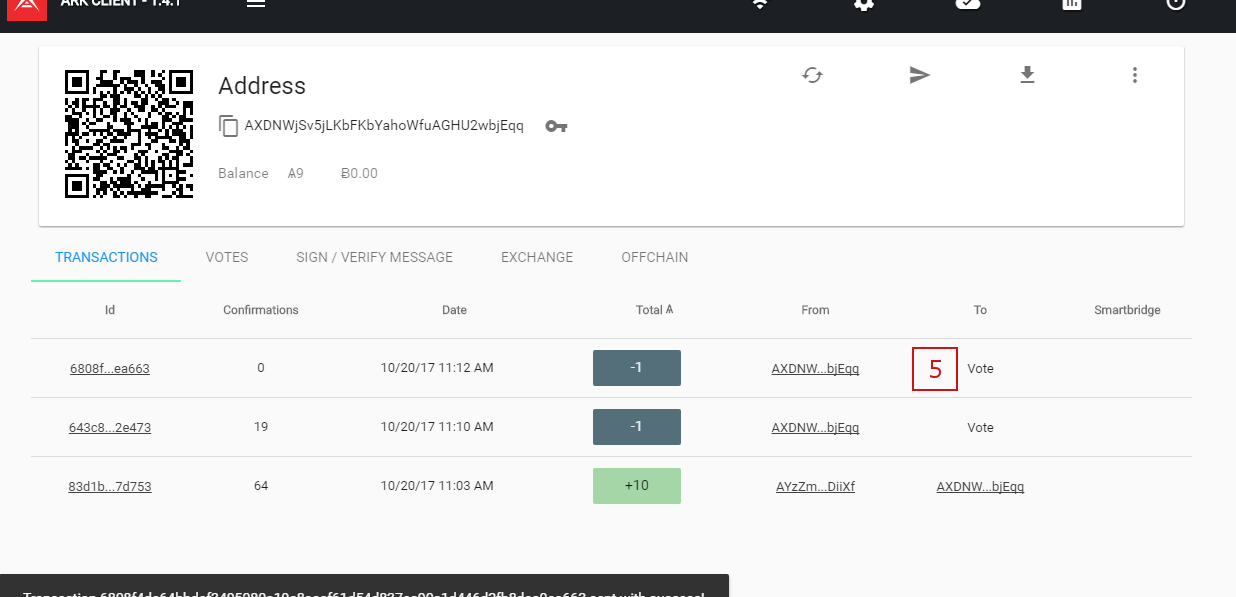
ARK’s Delegated Proof of Stake¶
ARK’s DPoS seeks to reduce the computational power necessary to power the blockchain as well as improve on the decentralization of Bitcoin and other cryptocurrencies. ARK solves necessary computational power by reducing the number of nodes allowed to forge new blocks. To this end, reducing the number of trusted entities allowed to forge to 51 Delegates also helps to break monopolistic control over future blockchain technology decisions by establishing a minimum number of parties that must vote independently for each decision.
To solve the issue of repetitive computations for a single transaction, the DPoS system requires a democratically elected group of Delegates who are able to forge new blocks for the chain. Any block coming from a different source is rejected outright, and only blocks from these Delegatess will be subject to confirmation, reducing the effective input to the chain and the amount of confirmations and thus computations needed. When forging, these Delegatess are shuffled into a random order and once that order has been exhausted are shuffled again to begin the cycle anew. When blocks are successfully forged Delegates are rewarded in ARK. Delegates who fail to forge a block when needed may be voted out of the witness pool later and are not rewarded, as no work has effectively been done. Finally, Delegates who act in nefarious ways are subject to being publicly voted out of the system to the benefit of the community.
The DPoS system also addresses centralization in an apt manner by initially setting the number of trusted parties, or Delegates needed to 51. In practice, Bitcoin and other Proof of Work coins are subject to being centralized in a “soft” manner via entities monopolizing the computing power behind the blockchain in question. For example, if Actor X owns 80% of the computing power behind the blockchain they effectively gain control of the technical direction of the coin, as they are the one who will selectively update the technology. In the future, if the ARK community decides that 51 Delegates are not enough to ensure the proper level of decrentralization, then the community can vote to increase this Delegate count. This guarantees at minimum a better safe guard against monpolization of the blockchain when compared to Bitcoin and other Proof of Work cryptocurrencies.
Delegated Proof of Stake compared to Proof of Stake¶
TODO